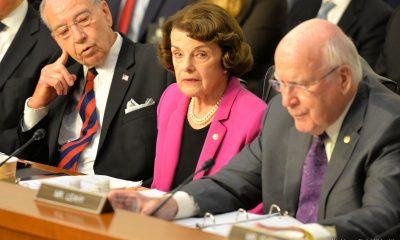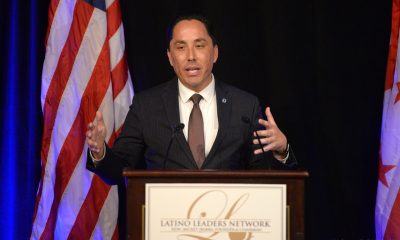Politics
Gay GOP former congressman calls for UAFA passage
Kolbe testifies before the Senate on LGBT-inclusive immigration reform
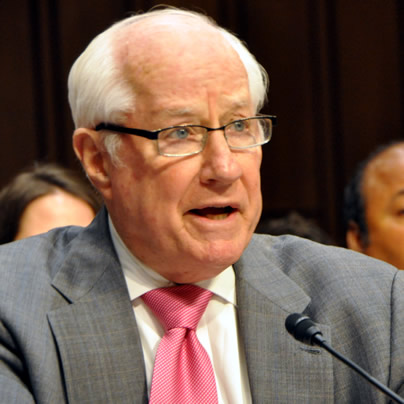
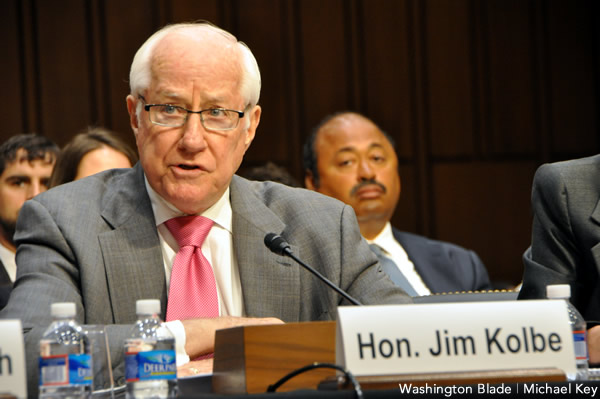
Former congressman Jim Kolbe testified before the Senate on UAFA (Blade file photo by Michael Key)
A gay Republican former U.S. House member testified before the Senate on Monday in favor of including bi-national same-sex couples as part of comprehensive immigration reform — an issue that affects him personally.
Jim Kolbe, who represented Arizona in Congress from 1985 to 2007, spoke during a Senate Judiciary Committee hearing about LGBT-inclusion in immigration reform both in personal terms and economic benefits for the country.
“While the bill you are considering is an excellent starting point for reform, I submit to you that it is still incomplete,” Kolbe said. “Families like mine are left behind as part of this proposal.”
Language to enable gay Americans to sponsor a same-sex partner for residency in the United States wasn’t included as part of the 844-page base bill for comprehensive immigration reform that was produced by the “Gang of Eight.”
Standalone legislation along these lines is known as the Uniting American Families Act. LGBT advocates say they’ve received assurances such language would be offered as an amendment — possibly by Senate Judiciary Committee Chair Patrick Leahy (D-Vt.) — when the committee marks up the reform legislation.
Kolbe is in an eight-year relationship with Panama native Hector Alfonso, who came to the United States on Fulbright scholarship to pursue studies in special education and has been a teacher for two decades. The couple had to endure a year-long separation when Alfonso had to return to Panama while immigration issues were being sorted out, although he’s now in the United States on a green card.
“It was a long process; it was an expensive far beyond the reach of most families,” Kolbe said. “We are immensely fortunate that Hector has now secured an investment visa that allows him to remain here with me. Many other couples, however, are not so fortunate. Their ability to secure a solution that will allow them to build a home, family and business together is elusive and difficult to realize.”
Kolbe, a trade expert who works at the German Marshall Fund think tank, also addressed economic benefits of passing language for bi-national same-sex couples as part of immigration reform — particularly support for the provision among U.S. businesses.
“The comprehensive immigration reform bill now under consideration by this Committee includes important provisions to make U.S. businesses more competitive,” Kolbe said. “UAFA does the same, which is why it is supported by Fortune 500 companies like Intel, Marriott, Texas Instruments and US Airways, who have called on lawmakers of both parties to support its passage. The failure to recognize lesbian and gay families in our immigration laws has a direct impact on American business.”
As part of his testimony, Kolbe read a letter signed by 28 prominent American businesses calling for UAFA citing loss of productivity, costs of transferring and retaining employees and missed opportunities to bring talent into the United States as a result of the current system.
“It is time, Chairman Leahy and members of the Committee, to fix this part of our immigration law,” Kolbe concluded. “The opportunity is too rare, and the positive impact too great to leave anyone behind. Adding UAFA to the committee bill would be a big step toward making it a truly comprehensive bill.”
Kolbe and Alfonso plan to wed in D.C. on May 18. While straight Americans are able to sponsor their foreign spouses for residency within the United States, Kolbe doesn’t have that option because of the Defense of Marriage Act, which he voted for as a member of Congress in 1996. The U.S. Supreme Court could address this problem if justices issue a ruling by June striking down Section 3 of DOMA as a result of pending litigation.
Steve Ralls, a spokesperson for the LGBT group Immigration Equality, said Kolbe’s personal story and background as a member of Congress make him an excellent spokesperson for UAFA.
“Congressman Kolbe is the perfect messenger to remind Senators that this is about families, not partisan politics,” Ralls said. “This issue impacts Republicans and Democrats, and it UAFA’s inclusion in the bill should garner bipartisan support, too.”
A number of Democratic senators on the panel expressed support for Kolbe and including UAFA as part of immigration reform, such as Senate Majority Whip Richard Durbin (D-Ill.) and Al Franken (D-Minn.). Republicans were present during the hearing — including Ranking Member Sen. Charles Grassley (R-Iowa) and Sen. Jeff Sessions (R-Ala.) — but didn’t address Kolbe’s testimony or UAFA.
Franken, a UAFA co-sponsor, was among those who expressed support for including UAFA as part of immigration reform, saying he and colleagues will do “everything we can” to amend reform to include the measure.
“You’re not alone,” Franken said. “I’ve heard many stories from my LGBT constituents about how our immigration system is tearing their families apart.”
Franken cited a story from a constituent, whom he called “Mark,” a Fortune 500 company worker who has an Italian partner, Alberto, that intended to move to Minnesota under a waiver program for Europeans.
According to Franken, when they were identified as a same-sex couple by Customs & Border Protection at the airport, Alberto was interrogated, forced to surrender his personal email password and was eventually he couldn’t remain in the country. Alberto is now in the United States on a visa, but that’s only a temporary solution.
“Mark is prohibited from sponsoring Alberto for permanent residency,” Franken said. “Under current law, Mark must choose between his career and the person he loves. It isn’t fair, it’s wrong and I just wanted to tell you that I and many others senators on this panel are going to do everything we can to try to see that we amend this bill to protect all families, including those of all LGBT Americans.”
Another question came from Sen. Amy Klobuchar (D-Minn.), another UAFA co-sponsor, who asked how the issue for bi-national same-sex couples would be affected if the Supreme Court strikes down DOMA. Kolbe said it’s not clear what the ruling of the Supreme Court would be in June, but emphasized the legislation isn’t about marriage.
“This bill does not deal with the issue of marriage at all,” Kolbe replied. “While DOMA defines marriage as between a man and a woman for federal purposes, this legislation simply says for immigration purposes, an individual can immigrate into the United States.”
Following the hearing, Kolbe told the Washington Blade that nothing the senators said surprised him and other issues related to immigration reform, such as temporary employment for migrant workers, were more controversial than same-sex couples.
“There was nothing that was terribly surprising in the questions,” Kolbe said. “I think it went pretty much as expected. I think all the members are really focused very heavily on this H-1B program and how that’s going to be made to work.”
Kolbe said he believes the committee has the votes to amend the immigration legislation, but whether that will remain in the bill as the legislative process goes forward remains in question.
“I think it’s very likely that it will be included in the bill when it goes to the Senate floor,” Kolbe said. “What will happen on the floor — and even more critically, what will happen in the House of Representatives — I think it’s just way to early to tell yet.”
Read Kolbe’s written testimony here.
Politics
First lady warns Trump is ‘dangerous to the LGBTQ community’ at HRC event
Jill Biden spoke in Arlington, Va., on Friday
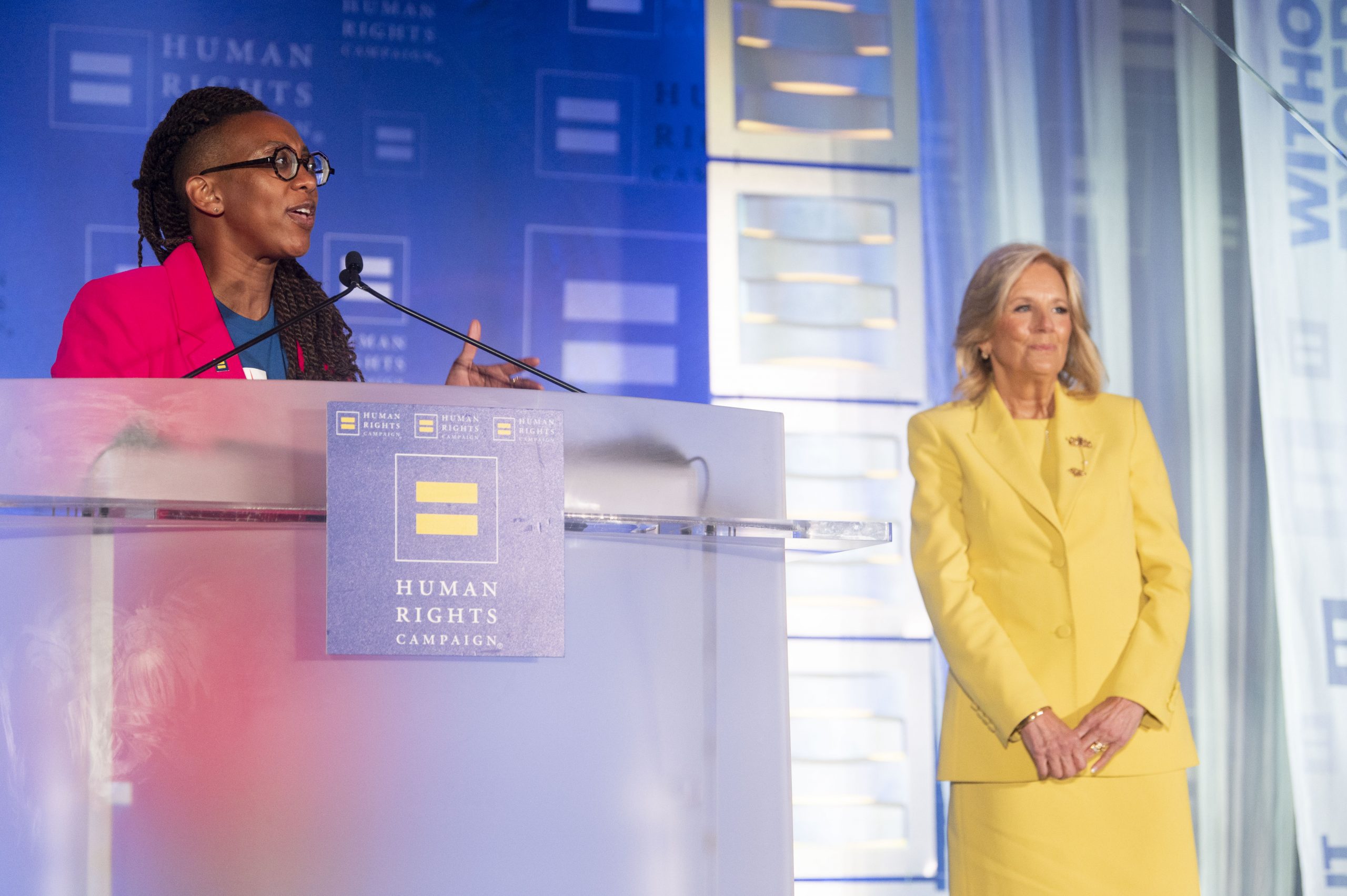
Delivering a keynote address at the Human Rights Campaign’s Equality in Action event Friday, First lady Jill Biden warned former President Donald Trump is “a bully” who is “dangerous to the LGBTQ community.”
Her appearance at the three-day volunteer and board gathering at the Sheraton Pentagon City in Arlington, Va., comes as part of the Biden-Harris reelection campaign’s “Out for Biden” program, which aims to “mobilize LGBTQ+ voters, communities, and leaders across the country.”
“Today, this community is under attack,” Biden said. “Rights are being stripped away. freedoms are eroding. More and more state laws are being passed targeting this community. Just last month, we had to fend off more than 50 anti-gay amendments that Republicans tried to force into the government funding bill.”
“These were extreme measures aimed directly at this community — measures that would have limited health care and weakened protections for same sex couples,” she said. “And they served only one purpose to spread hate and fear.”
In a nod to her long career as an educator, Biden said, “History teaches us that our rights and freedoms don’t disappear overnight. They disappear slowly. Subtly. Silently.”
She continued, “A book ban. A court decision. A ‘Don’t Say Gay’ law. One group of people loses their rights and then another. And another. Until one day you wake up and no longer live in a democracy … This is our chapter of history and it’s up to us how it ends.”
Biden then highlighted some of the advancements for LGBTQ rights secured under the Biden-Harris administration.
“Thanks to President Biden, marriage equality is now the law of the land,” she said. “He ended the ban on gay and bisexual men donating blood. He’s made it possible for trans Americans to serve openly and honorably in our military. And he’s standing firmly against conversion therapy.”
“Yes, there are forces outside these walls that are trying to erase these hard fought gains, trying to unwind all the progress that we’ve made,” Biden said. “They want to take our victories away, but we won’t let them. Your president will not let them — I will not let them.”
Politics
‘Out for Biden-Harris’ LGBTQ-targeted campaign is launched
Several events planned in coming weeks
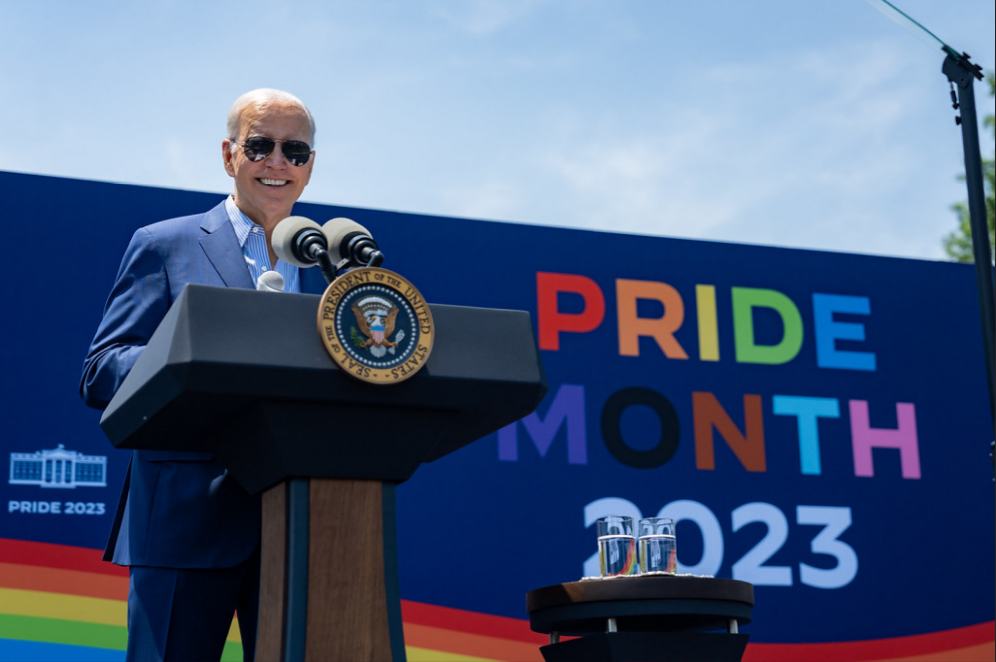
The Biden-Harris campaign on Wednesday debuted “Out for Biden-Harris,” which is a “national organizing and engagement program to mobilize LGBTQ+ voters, communities, and leaders across the country.”
Out for Biden-Harris “will train supporters to organize within their own networks and leverage messengers from the community to ensure we are meeting LGBTQ+ voters where they are,” the campaign wrote in a press release announcement.
“From drag queens to elected leaders to LGBTQ+ faith leaders, Team Biden-Harris will use a wide range of validators to communicate what’s at stake for the LGBTQ+ community in this election and why it’s critical that we vote for Joe Biden and Kamala Harris.”
The campaign also previewed some of the events and initiatives in coming weeks, which will include:
- A virtual organizing call featuring actor Wilson Cruz, Congressman Robert Garcia, HRC President Kelley Robinson, to mobilize LGBTQ+ supporters;
- A series of virtual relational organizing trainings focused on activating and reaching new volunteers targeting battleground voters. The campaign will be engaging trusted messengers, including high-profile and trusted messengers in the LGBTQ+ community, like Brita Filter, Danica Roem, Gina Ortiz Jones, and Rev.
- Hosting a series of Out For Biden-Harris house parties and community events including events in Phoenix, Arizona, Ferndale, Michigan, Milwaukee, Wisconsin, Philadelphia, Pittsburgh, and Harrisburg, Pennsylvania, and Las Vegas, Nevada to mobilize supporters.
- First Lady Jill Biden will be a featured speaker at the Human Rights Campaign Equality In Action Conference bringing together a network of 400 organizers and activists in Arlington, VA.
The campaign noted that LGBTQ voters will be “a key part” of its coalition, while 39 percent of voters consider LGBTQ equality a “make-or-break issue.”
“In 2020, nearly 11,000 LGBTQ+ volunteers mobilized to help elect President Biden and Vice President Harris,” the campaign wrote. “This year, Out for Biden-Harris will re-engage these supporters and build on their work. The program is designed around the idea that there is no better messenger to mobilize LGBTQ+ voters than their friends and neighbors to bring new supporters into our campaign.”
The Biden-Harris administration is the most pro-LGBTQ in history, and LGBTQ groups with a combined 3.8 million members have endorsed President Joe Biden’s reelection campaign.
However, “the fight for equality for all Americans is at stake this November as Trump and his allies plan to roll back the rights and freedoms of LGBTQ+ Americans,” the Biden campaign wrote. “Trump and his MAGA allies are running on an extreme, anti-LGBTQ+ agenda which would push to discriminate against the LGBTQ+ community, even going after the right to marry who you love.”
“LGBTQ+ voters are a force to be reckoned with. They were critical to our victory in 2020, and they will be critical to winning again this November,” said Biden-Harris 2024 Campaign Manager Julie Chavez Rodriguez. “That’s why we’re thrilled to launch Out for Biden-Harris, which will harness the LGBTQ+ community’s organizing prowess to reelect President Biden and Vice President Harris this November.”
Chavez Rodriguez continued, “LGBTQ+ Americans couldn’t have more at stake this election: Donald Trump and his extremist allies are running to gut LGBTQ+ rights and erase history as their top priorities. LGBTQ+ Americans deserve leaders who will fight for every American’s freedom and dignity. That’s what President Biden and Vice President Harris have done throughout their time in office, and what they will do if reelected, including pressing Congress to pass the Equality Act.”
“There has never been a more critical time to protect the rights of all Americans, no matter who you love or how you identify, and Out for Biden-Harris will be critical to not just safeguarding, but strengthening the rights and voice of every single American,” she said.
Politics
Melania Trump to host Log Cabin Republicans event
Former first lady is close with the group

Former first lady Melania Trump is back on the campaign trail with plans to host a fundraising event for the conservative LGBT group Log Cabin Republicans on April 20 at Mar-a-Lago, Politico reported on Thursday.
Funds will be used to support the group’s “Road to Victory” program, which will target voters in swing states. LCR has had a close relationship with Mrs. Trump, who was a special guest for its Spirit of Lincoln Gala in 2021, where she received the Spirit of Lincoln Award.
Politico reports that the host committee for this month’s event will include GOP donors Saul Fox, Amanda Schumacher, Bill White, Bryan Eure and Richard Grenell, who is gay and served as ambassador to Germany and acting director of national intelligence during the Trump administration.
“Melania Trump’s work as first lady, from helping children reach their full potential to championing a more inclusive Republican Party, has been historic,” LCR President Charles Moran said in a 2021 press release concerning the Spirit of Lincoln event.
“Her vocal support of Log Cabin Republicans has been a signal to Republicans everywhere that it is possible to simultaneously be conservative and support equality under the law for all Americans,” he said.
-

 LGBTQ Non-Profit Organizations5 days ago
LGBTQ Non-Profit Organizations5 days agoDay of [no] silence, a call to speak out against anti-LGBTQ+ hate
-

 Africa1 day ago
Africa1 day agoCongolese lawmaker introduces anti-homosexuality bill
-

 Colorado3 days ago
Colorado3 days agoFive transgender, nonbinary ICE detainees allege mistreatment at Colo. detention center
-

 South America5 days ago
South America5 days agoMan convicted of killing Daniel Zamudio in Chile seeks parole

